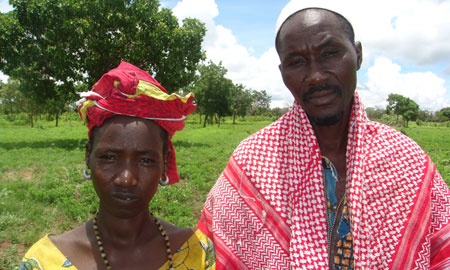The Health Policy Project ended in 2016. Work continued under Health Policy Plus (HP+) until 2022.
NEWS & VIEWS
Religious leader in rural Mali becomes example for practicing family planning
September 13, 2011
 |
Imam Mahamadou Dembélé and his wife lead by example after adopting family planning methods at their local community health center in the village of Tambaga.
|
Imam Mahamadou Dembélé is a well-respected imam--an Islamic religious leader--in the rural area of Tambaga, which is located near Kita in southwestern Mali. Like his father, who was also an imam, he believes that to be a man of great influence, you must always practice what you preach.
For him, as with other religious leaders, family planning, reproductive health, and basic education about health issues are not topics in which he had much knowledge. However, with high rates of fertility and maternal and child mortality and the continued threat of infectious diseases, the imam recognized the dangers to the overall health and well-being of people in Mali.
Recently, Imam Dembélé attended a training seminar sponsored by the Health Policy Project on health education and advocacy for religious leaders. There, he learned about the importance of reproductive health and family planning, and how certain practices like birth spacing can improve the health of mothers and children. Imam Dembélé also learned about other health issues that affect people living in his area, including malaria and HIV, and how to help his community address these challenges.
Imam Dembélé emerged from the workshop with an energetic desire to spread the crucial health information to as many people as possible. He organized a meeting for the entire village in which he explained that Islam accepts birth spacing and urged villagers to visit community health centers for these services. The imam also warned against discrimination toward people living with HIV, explaining that HIV is like all other health issues, and advised his audience to accept those who are HIV positive.
Outreach workers from the Kita community health center subsequently traveled to Tambaga to conduct an information session about reproductive health and provide family planning services to village women. Imam Dembélé led a discussion on family planning and, adhering to his principle of leading by example, the imam's wife was the first person in the group to adopt a family planning method. "I started with my own family because I am convinced of the health benefits of family planning," says Imam Dembélé.
Imam Dembélé has since traveled to several community health centers in the region to hold education and advocacy sessions with clients. He also brought his two wives for family planning counseling and services. The imam has expanded his efforts to additional community health centers in nearby areas, including Sagabari and Kobri, helping to cover ground for two of his colleagues who were unable to attend the imam advocacy workshop.
His influential words and actions are already making a difference. Staff from the local health clinics remark that before Imam Dembélé's interventions, few clients came in for family planning. However, after hearing his messages and following his example, they have noticed a sharp increase in the number of people who visit their facilities because of his encouragement.
For Imam Dembélé, simply "talking the talk" is not enough to promote healthy behaviors. By "walking the talk," he has proven that actions truly speak louder than words.
What's New
- Something to Build On: “Innovation Exchange” Celebrates the Health Policy Project’s Close and a New Beginning
- What Will it Take for Tanzania to Achieve ART Targets and Ensure Long-Term Sustainability of the HIV Response?
- Helping Kenya’s County Leaders Advocate for Increased Health Investments
- HPP Holds Working Meeting on Ensuring Responsible PEPFAR Transitions for Key Populations
- Health Policy Project Celebrates 2016 International Women's Day
- HPP Staff Participate in White House Conference on HIV Stigma Reduction

